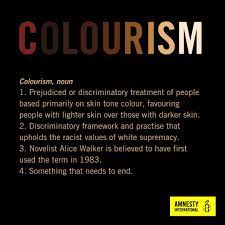Categories
PDF Books
- Post author By Ismail ibn Nazir Satia
- Post date 5 March 2023
- 1 Comment on PDF Books
- Sticky post
How many times have you heard within your family, something along the lines of ‘he’s really good looking and fair’ or ‘she’s so fair’ with their eyes lit up? How many times have you heard something like ‘it’s all good but he’s quite dark’ with a tinge of sympathy or ‘I hate getting tanned!’ In a tone that’s a little bit uncomfortable? This is colourism. Colourism is a form of heavy discrimination within the same race, it’s internal, it’s a ‘within your own people’ problem… and boy, don’t we all know about it. I still struggle to believe that in 2022, it is STILL an issue, still, a thing that’s got to be spoken about and still an innate disease stirring in and amongst us.

When the British ruled India, discrimination based on skin colour was most visible. The white British foreigners were symbols of power, authority and wealth and thus, light skin served as a signal of high status across the country. Those individuals with a lighter skin colour enjoyed more privileges from the British, were considered to have a more affluent status and gained preference in education and employment and darker-skinned individuals were socially and economically disadvantaged, and this disease continued…
This dangerous phenomenon of colourism passed on, to the extent that huge, ‘forward-thinking’ corporate brands such as L’Oreal have had no qualms in putting up gigantic billboards across the busy roads of India advertising their skin-lightening products with famous celebrities such as Priyanka Chopra (who, ironically, likes to push herself as a humanitarian) being the face of such companies. So, is it really any wonder that the power of colourism has crept into our South Asian psyche so silently and so dangerously, that today in 21st century Britain, we are still so wrapped up about the colour shade of our own people.
In a Hadeeth, it is narrated: ‘We passed by Abu Dharr (Allah be pleased with him) in Rabadha. Abu Dharr (Allah be pleased with him) said, “I had a quarrel with one of my brethren whose mother was of foreign descent, so I vilified him as ‘you son of a black mother’. He went to complain about me to the Prophet ﷺ. When the Prophet ﷺ met me (one day), he said, ‘Abu Dharr, you are someone who still displays Jahiliyyah (ignorance).’ Now, this Hadeeth might be focused on racism rather than colourism but the concept is the same. Discriminating and belittling because of the colour of the skin was deemed as ‘someone who still displays ignorance’ by our Prophet ﷺ. Our beloved Prophet ﷺ was a forward-thinking man, he was progressive in his ideologies and so for him, this was incredibly backwards. He remarked to Abu Dharr (Allah be pleased with him) that he ‘still’ displayed signs of ignorance so imagine if our Prophet ﷺ was to see that 1400 years later, we, the South Asian community, STILL have deeply entrenched traits of colourism within us. We still have marks of ignorance. We still haven’t progressed. We still think fair skin = excellence and dark skin = inferiority.
If we zoom in, we can observe that colourism has played a dark and ugly role in the field of matrimony. I use past tense, but a huge part of me says that should be corrected to the present tense and that colourism still rears its ugly head in marriages. It beggars disbelief when a mother refuses to accept a girl for her son because she’s ‘a bit on the dark side’. When asked for a potential spouse, ‘fair’ is a requirement. Yes, ‘fair’. They are flagrantly and unashamedly stating that a person with darker skin shade is not good enough for their family.
Colourism is heavily embedded throughout South Asian culture. The lack of melanin in your skin isn’t just used as a marking point of attractiveness, but the colour of your skin is frequently used to determine your self-worth. And this toxic rhetoric spills out of the household, out of our communities, and feeds into racism beyond our culture. If we don’t like dark-skinned Asians, we definitely don’t like the Black community – it’s an uncomfortable truth, isn’t it?

I’d like to think the tide is slowly turning. The international brand Unilever recently announced it would no longer use the word ‘fair’ in the name of its popular (in South Asian countries) skin-lightening cream Fair & Lovely. Johnson & Johnson has discontinued two skin care products that promote “fairness”. While, most recently, L’Oreal has stopped using the words “fair”, “fairness”, “light” and “lightening” on its products. So we have some progress. But that’s just the tip of the iceberg. Colourism is so deeply embedded in our communities from the top down and unfortunately, we still have a lot of work to do. We actively need to hold conversations around it to stamp it out properly. It’s a mindset that needs to be changed and reformulated. We have to be more alert to the micro aggressions that have become a part of our daily dialect, especially amongst the older generations (‘she’s so dark’ ‘you need to scrub your tan off’, ‘I wish I was fairer’…) and be brave enough to challenge them.
Ismail ibn Nazir Satia (one who is in dire need of Allah’s forgiveness, mercy and pleasure)
1 Dhul Hijjah 1443
Ali (Allah be pleased with him) once was asked: “How have you recognised your God?”
He (Allah be pleased with him) answered: “I recognised God through revoking the determinations and breaking the intentions. When I determined and I was prevented from achieving my determination, and when I intended and fate contradicted my intention, I realised that the Administrator was other than me.”
And so this uneventful year draws to a close and I find myself thinking how much history 2020 made. Be it the pandemic, racial tensions or presidential campaigns across the pond, 2020 has been one long rollercoaster.
Life is full of surprises and if anything, this year has shone a light on how amazingly resilient Allah has created us all. Just when we are about to put our feet up and become a little complacent with our routine in life, the setting suddenly changes and we’re forced to recompose, reshuffle the pieces and refocus the lens a little. And in the midst of this restructure, our unsteady walk exposes us, we trip, we fall and we fail…but we brush ourselves off and stand back up. A quote of JK Rowling comes to mind that ‘It is impossible to live without failing at something unless you live so cautiously that you might as well not have lived at all – in which case, you fail by default.’ This year has been a year of ‘falling’ for many of us but with the tradition of reflection (Muhasabah – account ourselves to ourselves) maybe we can transform the ‘falls’ into life-changing goals.

The biggest lesson that was manifested this year is that ‘Allah never tests a soul more than it can bear’ (Quran, 2:286). There are so many beautiful lessons to learn from this verse alone that could put this whole year into perspective for many of us. This world is a test and each and every one of us will be tested in various ways. A utopian society does not exist and 2020 has very clearly shown us that. Once we truly understand this, we can start to formulate that as Muslims, it is crucial we believe that Allah tests us to make us, not break us. When total fear ensued in March, Allah’s powerful promise in the Quran should have been our zen and reassurance amidst the chaos. Our goal for 2021 is to place our complete trust in Him SWT and His plan. He SWT doesn’t leave us, but we leave Him. He doesn’t move an inch away from us and is closer to us than our jugular vein.
As Ramadhan drew closer and it dawned on us that the Masajid would remain closed and Taraweeh Salah will have to be performed in the homes, a heart-breaking sadness cloaked us. Who will be leading? What will be prayed? How much Qur’an do we know? Will it even feel like Ramadhan? As these questions were being discussed in every household up and down the country, a new lesson was emanating. Alhamdulillah, many homes echoed with the confident recitations of their Huffadh but the hard truth is that there still remained a huge number of us who hadn’t prioritised reading and learning the Quran enough to be able to stand up and confidently take on the musalla. We were always so reliant on the Ulama and the Huffadh that we had become complacent with our own learning journey. This reminded me of how I will be alone in my grave, just me and my deeds – no Hafidh to fall back on, no Alim to rely on, no one. The closure of the Masajid and the emptiness that came with it threw us into frantic jeopardy but ‘A believer is never stung from the same hole twice’ (Hadith) and so Ramadhan 2020 taught us to never stop learning. Know 10 Surahs from Juz Amma? Make it your goal to learn another 10 this year. Learn Surah Yaseen. Learn Surah Mulk. Learn Surah Rahman. Never stop learning. Create an insatiable hunger for learning. When you get to the end of your life, you want to be able to tell yourself that I spent every year of my life learning something new from the Qur’an and didn’t stay stuck on ‘Madrasah Mode’ from my teenage years.
2020 brought out some of the ugliest faces yet the most soul-soothing actions. Whilst on the one hand racism hit another high, unity in the face of tragedy outshone. The pandemic may have thrust us into isolation but it brought a sense of togetherness that was not seen before. Communities came together, putting aside creed, caste and religion, to help the elderly, vulnerable, isolated with food packages, medicines, shopping and that’s just the tangible needs. Neighbours checked in on one another, more phone calls were made to friends and family, messages dropped in asking how we’re doing. Let’s make it our mission to continue this fulfilling deed. Send that text message, make that two-minute phone call, and don’t just call someone when you need them. Mother Teresa once said, ‘Loneliness is a terrible poverty’ and there are millions of people suffering from that lack of friendship. In these difficult times, make someone feel heard. Our beloved Prophet ﷺ said, ‘You won’t be able to take care of everyone financially; instead, let your cheerful face and good manners take care of all of them’ (Musnad Bazzar).

Now we are at the suggestive, somewhat enticing, light at the end of the tunnel stage of the pandemic, we are tested once again. The vaccine is available and whatever side of the fence you sit on, remember that Allah is the Controller. Everything truly belongs to Him alone and he holds authority over everything and everyone. One Quran verse frequently came to mind at different times this year. Allah says, ‘لمن الملك اليوم، لله الواحد القهار ‘For whom is the dominion today? For Allah, the One, the Supreme’ (Quran, 40:16). Allah gives and Allah takes. Let’s not talk as if this year has been a year of just the revolutionising scientists against the evil virus, forgetting all along that Allah is the Master, the Withholder, and the Bestower of all things.
It has been a challenging year but for the intelligent believer, no challenge comes without changes. We may want to be quick to forget all that 2020 put on our plate but let’s remember the lessons it taught us and the goals it guided us to make.

Ismail ibn Nazir Satia (one who is in dire need of Allah’s forgiveness, mercy and pleasure)
15 Jamada al-Awwal 1442
On Saturday, 19 January 2019, 10:43:43 GMT, imraan <admin@daruliftaa.net> wrote:
Question:
Salams Mawlana,
I would like to ask, as we live in England and Christmas is creeping up slowly, many Muslims decide to have a feast on Christmas day with the family. They specifically cook Turkey, imitating the non-Muslims.
They say it is the only day the family can get together (as Xmas day is a bank holiday). But I usually tell them Boxing Day is also a Bank HOliday, cook it on the 26th December?
Is cooking a Turkey on Xmas day permissible, in light of the Hadith, “Whoever imitates a nation is from them.”
Ismail, Blackburn
Answer:
In the Name of Allah, the Most Gracious, the Most Merciful.
As-salāmu ‘alaykum wa-rahmatullāhi wa-barakātuh.
Cooking turkey and eating it on Christmas Day is a custom of the Christians.[1]
King Henry VIII was the first English king to eat turkey on Christmas Day. The tradition of eating turkey at Christmas spread throughout England in the 17th century. It also became common to serve goose which remained the predominant roast until the Victorian era. [2]
In the 1900s, turkey became a popular Christmas dish where it became more accessible and affordable.[3]
The Fuqaha (jurists) have ruled that it is impermissible to offer gifts or perform another action that is conducted by the non-Muslims on their sacred days.[4] Consider the following warnings issued by the Fuqaha on such conduct:
Imam Qadhi Khan (rahimahullah) mentions:
وعن الإمام أبي جعفر الكبير رحمه الله تعالى: اذا عبد الرجل خمسين سنة، ثم جاء يوم النيروز وأهدى الى بعض المشركين بيضة يريد به تعظيم يوم النيروز فقد كفر بالله وحبط عمله[5]
“It is narrated from Imam Abu Ja’far Al Kabir (rahimahullah Ta’āla) that if a man worshipped Allah for fifty years, then on the day of Nayruz, he gifted an egg in respect of Nayruz, then he has disbelieved in Allah and all his (good) deeds have been lost.”
Nayruz (also known as Nowruz) is the Zoroastrian New Year’s day. It is celebrated by the Zoroastrians (followers of Zoroastrianism).[6]
It appears that there is nothing wrong in gifting an egg. However, such an act will be analysed in the context of the sacred day of the Zoroastrians. They exchange gifts on that day in reverence of that day. When a Muslim offers another a gift, it resembles the action of the Zoroastrians respecting that day, hence, it is impermissible.
Imam Burhan ad Deen al Bukhari (rahimahullah) has mentioned:
المسلم اذا أهدى يوم النيروز الى مسلم آخر شيئا ولم يرد به تعظيم اليوم ولكن جرى على ما اعتاده بعض الناس لا يكفر، ولكن ينبغي ان لا يفعل ذلك في ذلك اليوم خاصة، ويفعله قبله أو بعده كيلا يكون شبيها بأولئك القوم وقد قال النبي عليه الصلاة والسلام: (من تشبه بقوم فهو منهم)[7]
“If a Muslim gives a gift to another Muslim and he does not intend glorifying that day but it is the habit of some people, he will not have committed kufr. However, he should not do that on that specific day. He should do it before it or after it so as to not imitate those people for verily Nabi (sallallahu alayhi wasallam) has said, “Whosoever imitates a group of people is amongst them.”
Shaikh Zadah Efindi (rahimahullah) mentions:
ويكفر بوضع قلنسوة المجوس على رأسه على الصحيح إلا لتخليص الأسير أو لضرورة دفع الحر والبرد عند البعض وقيل إن قصد به التشبيه يكفر[8]
“According the most correct opinion, that person has committed kufr if he wears the headwear of a Magian except, according to some, to free a prisoner of war or for a need (such as) to keep away the cold and heat. It has been said that if he intended imitation by it, then he has committed kufr.”
Rasulullah (sallallahu alayhi wasallam) is reported to have said:
مَن تَشَبَّه بقومٍ فَهُوَ مِنْهُم[9]
“Whosoever imitates a group of people is amongst them.” (Abu Dawood: 4031)
Therefore, Muslims should not cook turkey on Christmas day and eat it.
And Allah Ta’āla Knows Best
Mizanur Rahman
Student, Darul Iftaa
UK
Checked and Approved by,
Mufti Ebrahim Desai.
[1] British Turkey. 2018. Christmas Day Meal Stats. [ONLINE] Available at: http://www.britishturkey.co.uk/facts-and-figures/christmas-day-meal-stats.html.
The Fact Site. Why Do We Eat Turkey on Christmas Day?. [ONLINE] Available at: https://www.thefactsite.com/2012/12/why-do-we-eat-turkey-on-christmas-day.html.
[2] Wikipedia. 2018. Christmas dinner. [ONLINE] Available at: https://en.wikipedia.org/wiki/Christmas_dinner.
[3] British Turkey. 2018. Christmas Day Meal Stats. [ONLINE] Available at: http://www.britishturkey.co.uk/facts-and-figures/christmas-day-meal-stats.html.
[4] البحر الرائق شرح كنز الدقائق ومنحة الخالق وتكملة الطوري، زين الدين بن إبراهيم المعروف بابن نجيم المصري (المتوفى: 970هـ)، دار الكتاب الإسلامي، القاهرة، مصر (5/ 133)
وبخروجه إلى نيروز المجوس والموافقة معهم فيما يفعلون في ذلك اليوم وبشرائه يوم النيروز شيئا لم يكن يشتريه قبل ذلك تعظيما للنيروز لا للأكل والشرب وبإهدائه ذلك اليوم للمشركين ولو بيضة تعظيما لذلك اليوم
حاشية رد المحتار على الدر المختار: شرح تنوير الأبصار، محمد أمين الشهير بابن عابدين (المتوفى: 1252هـ)، ايچ أيم سعيد كمبني، كراتشي، باكستان (6/ 755-754)
(والإعطاء باسم النيروز والمهرجان لا يجوز) أي الهدايا باسم هذين اليومين حرام (وإن قصد تعظيمه) كما يعظمه المشركون (يكفر) قال أبو حفص الكبير: لو أن رجلا عبد الله خمسين سنة ثم أهدى لمشرك يوم النيروز بيضة يريد تعظيم اليوم فقد كفر وحبط عمله اهـ ولو أهدى لمسلم ولم يرد تعظيم اليوم بل جرى على عادة الناس لا يكفر وينبغي أن يفعله قبله أو بعده نفيا للشبهة ولو شرى فيه ما لم يشتره قبل إن أراد تعظيمه كفر وإن أراد الأكل كالشرب والتنعيم لا يكفر زيلعي.
[5] فتاوى قاضيخان، فخر الدين ابو المحاسن حسن بن منصور المعروف بقاضيخان الأوزجندي (المتوفى: 592هـ)، دار الكتب العلمية (3/519)
وعن الإمام أبي جعفر الكبير رحمه الله تعالى: اذا عبد الرجل خمسين سنة، ثم جاء يوم النيروز وأهدى الى بعض المشركين بيضة يريد به تعظيم يوم اليروز فقد كفر بالله وحبط عمله
[6] Heritage Institute. Nowruz. [ONLINE] Available at: https://www.heritageinstitute.com/zoroastrianism/nowruz/index.htm.
Encyclopædia Britannica. 2013. Nōrūz. [ONLINE] Available at: https://www.britannica.com/topic/Noruz.
[7] المحيط البرهاني، برهان الدين محمود بت صدر الشريعة ابن مازة البخاري (المتوفى:616هـ )، ادارة القرآن والعلوم اسلامية، كراشي باكستان – المجلس العلمي، جوهانسبرغ، جنوبي أفريقية
9287- قال في الجامع الأصغر: رجل اشترى يوم النيروز شيئا لم يكن يشتريه قبل ذلك، ان أراد به تعظيم النيروز كما يظمه المشركون يكفر، وان أراد به الأكل والشرب والنعمة لم يكفر. 9288- قال صاحب الجامع الأصغر المسلم اذا أهدى يوم النيروز الى مسلم آخر شيئا ولم يرد به تعظيم اليوم ولكن جرى على ما اعتاده بعض الناس لا يكفر، ولكن ينبغي ان لا يفعل ذلك في ذلك اليوم خاصة، ويفعله قبله أو بعده كيلا يكون شبيها بأولئك القوم وقد قال النبي عليه الصلاة والسلام: (من تشبه بقوم فهو منهم).
[8] مجمع الأنهر في شرح ملتقى الأبحر ومعه الدر المنتقى في شرح الملتقى، الشيخ زاده المعروف بداماد أفندي (متوفى:1077هـ)، دار الكتب العلمية، بيروت، لبنان (2/ 513)
ويكفر بوضع قلنسوة المجوس على رأسه على الصحيح إلا لتخليص الأسير أو لضرورة دفع الحر والبرد عند البعض وقيل إن قصد به التشبيه يكفر
[9] سنن أبي داود ت الأرنؤوط، أبو داود سليمان بن الأشعث الأزدي السِّجِسْتاني (المتوفى: 275هـ)، دار الرسالة العالمية، بيروت، لبنان (6/ 144)
حدثنا عثمان بن أبي شيبة، حدثنا أبو النضر، حدثنا عبد الرحمن ابن ثابت، حدثنا حسان بن عطيه، عن أبي منيب الجرشي عن ابن عمر، قال: قال رسول الله – صلى الله عليه وسلم -:، من تشبه بقوم فهو منهم”
مرقاة المفاتيح شرح مشكاة المصابيح، علي بن (سلطان) محمد أبو الحسن نور الدين الملا الهروي القاري (المتوفى: 1014هـ)، دار الفكر، بيروت، لبنان – الطبعة الأولى: 2002م (7/ 2782)
(وعنه) : أي عن ابن عمر (قال: قال رسول الله – صلى الله عليه وسلم – (من تشبه بقوم) : أي من شبه نفسه بالكفار مثلا في اللباس وغيره، أو بالفساق أو الفجار أو بأهل التصوف

1) Know your audience and choose your style accordingly.
2) Read and practise! Read newspapers especially broadsheets, highlight words and remember them.
3) Listen and practise! Listen out for beautifully spoken English, find scholars online who speak well and use good terminology, write down the words they use and implement them into your own terminology.3) Use Apps such as Grammarly
4) Find your best ‘English’ person and ask them nicely to proofread and/or give feedback. Remember, this takes time so try not to become too reliant and learn from them so you can become confident yourself.
5) Use a dictionary NOT necessarily a thesaurus. It’s always cringingly obvious when someone has tried too hard; use sophisticated language but let it flow naturally. Like Orwell said, why use a long word when a short word will do.
6) Commas and apostrophes are cool. Teach yourself the rules regarding these.
7) Vary your sentence lengths so your writing sounds interesting/exciting/dramatic. Use conjunctions to create longer sentences but use short sentences too. A short sentence immediately after a long sentence always adds drama.
8) Keep it clean and simple. Don’t over complicate your writing in the attempt to impress. This will only discompose your reader and the main purpose of your writing will be lost.
9. Finally, start a blog. Writing will help you tremendously.
Ismail ibn Nazir Satia (one who is in dire need of Allah’s forgiveness, mercy and pleasure)
10th Muharram 1441
To proceed,
The tradition in Muslim religious literature of gathering collections of forty Hadiths dates as far back as the first century after the Hijrah. Abdullah ibn Mubarak al-Marwazi (Allah have mercy on him) is thought to be the first to have gathered forty Hadith in a collection. Perhaps the most well-known collection is that of Imam an-Nawawi (Allah have mercy on him), which has been translated into English, and on which there are several commentaries.
The practice of gathering forty Hadiths springs from a Hadith, narrated through several Companions, which puts the spiritual rank of religious scholarship within easy reach of the ordinary believer: “Whoever memorises forty narrations for my nation in matters of this religion, Allah will raise him up a scholar and I shall be an intercessor and witness for him on the Day of Rising.”
Allah make us from them.
Ismail
15 Shaban 1441
Keep Going!
In the name of Allah, the Most Beneficent, The Most Merciful
I want to begin by directly asking you a few questions. The first question I want to ask is if you saw an old lady crossing the road that needed help, would you choose to help her or would you leave her be? Secondly what do you think of a person who shouts at a baby for not being able to run?
Of course these questions may seem really weird for the moment but hang on in there and let me try to explain my point. Many people have a mentality that if I am committing a lot of sin, what is the point of me praying namaaz (5 daily prayers) or following any other of Allah’s commands for that matter. Well let’s look at the first question I posed at the start. If you answered yes then why should you do this? Isn’t helping an old lady a command of Allah?
Now I know some will say that this is the human thing to do. Well to follow Allah and His commands is also the human thing to do and if you want evidence then look deep in your heart to see if your heart is satisfied with your current life. Most people go to sleep unhappy every day or dissatisfied with their life. The obvious answer is that we are missing complete submission to Allah in our life. Isn’t it time to change and leave our old lives behind? Is it not time to turn back to Allah?
Some people, including myself when I was younger believe that Islam is only meant to be practised by a Hafiz or Alim. If this is you then let me ask you, will you be holding someone’s hand and taking them in your grave with you? If I want success in this world and the Hereafter I need to make changes in my life now. Neither me nor you know when the grave is going to swallow us up so shouldn’t we be making changes in our life now before it is too late?
I recently heard a very good point. We seem to be diverting ourselves to learn about the day of Qiyamah and we certainly should be, but isn’t there a bigger day coming for all us of very soon. Qiyamah will only come once all the major and minor signs told to us by the Prophet (Peace and blessings be upon him) have come to pass. However our death is imminent. It can strike at any time and there are no signs of death. When Allah recalls us, we have to go.
As for the second question presented at the start, many people in our society frown upon those that try to follow Islam but stumble here and there. It is in the nature of a person that he or she will commit sins however some people feel they are of a high enough status and position to criticise and try to bring these people down.
Allah says “And remind for verily a reminder benefits the believer.” (Al-Qur’an: Adh-Dhariyat: 55)
The Qur’an tells us to do the complete opposite to what we are accustomed to. We should be reminding each other with love and affection otherwise we push those away who are trying to discover the truth of Islam. No matter how old you are or how exalted we are in the eyes of the people, we all make mistakes. Even the Prophet Muhammad (Peace and blessings be upon him) used to ask for forgiveness from Allah (God) even though all the prophets were infallible. The whole point of mankind being created was because we do make mistakes but we then repent and ask for forgiveness from people.
Allah is not like mankind. Allah is Ar-Raheem (The Most Merciful). There is none like Him. If I was to upset any human it would leave a crack in the relationship just like cracks in the wall but Allah completely removes the sin like it didn’t even take place. Allah’s mercy is such that he puts a veil over all of our sins. This in itself is a big blessing. Just imagine everybody was to know all the bad you and I have done! How disgraced would we feel? One pious person mentioned that you know you have reached piety if you can walk around the market place with your desires on a silver platter. That is certainly something to think about!
Lastly I just want to mention about wisdom. It’s very important that when we talk to anybody about Islam we think before we speak. Some people do get very heated with debates of Twitter, Facebook etc. A discussion is absolutely fine and that is encouraged but social networking sites aren’t the place. Certainly it is better to discuss in person where the truth and be found and we merely aren’t keyboard warriors.
As Muslims we should be trying to encourage each other as much as possible and this is the way forward. Give your friend a pat on the back. Tell them that they have done something good today and most importantly, SMILE!
Jazakumullah Khayran
Yasin Ibn Suleman Desai
NoteAll the readers of this article, and others, are requested to share it on your Facebook, Twitter and other platforms to further spread our efforts